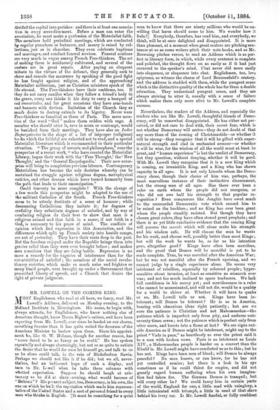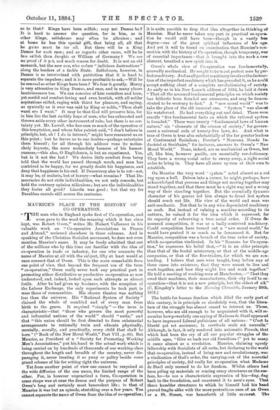MR. LOWELL ON THE COMING KING.
lt1OST Englishmen who read at all have, we fancy, read Mr. In Lowell's Address, delivered on Monday evening, to the Midland Institute in Birmingham. His name, to begin with, always attracts, for Englishmen, who know nothing else of American thought, know Hosea Biglow's satires, and have been expecting from Mr. Lowell, ever since he landed on our shores, something funnier than it has quite suited the decorum of the American Minister to bestow upon them. Since his appoint- ment he, like 0. W. Holmes, though for another reason, has "never dared to be as fanny as he could." He has spoken repeatedly and always charmingly, but not so as quite to satiate the desire that he would for once let himself go, and talk to us as he alone could talk, in the vein of Birdofredum Sawin. Perhaps we should not like it if he did; but we all, never- theless, feel an indiscreet hope of such a display, and turn to Mr. Lowell when he talks three columns with whetted expectation. Suppose he should laugh at aris- tocracy as he d'd at slave - owning, what would become of "Debrett" P His pre sent subject, too, Democracy, is his own, the one on w'aiolt he bait the reputation which made him represen- tative of the United States and a sort of personal friend to every man who thinks in English. [..It mast be something for a quiet
man to know that there are ninety millions who would be un- willing that harm should come to him. We wonder how it feels P] Everybody, therefore, has read him, and everybody, we think, will be at once delighted and disappointed. It is more than pleasant, at a moment when great orators are pitching sen- tences at us as some writers pitch their note-books, and as Mr. Browning pitches verses, to read an Address which is so per- fect in literary form, in which, while every sentence is complete and polished, the thought flows on as easily as if it had just occurred to the speaker's mind. Chat never slid more easily into eloquence, or eloquence into chat. Englishmen, too, love epigrams; as witness the charm of Lord Beaconsfield's oratory., and the address is studded with them, while the pungent sense which is the distinctive quality of the whole has for them a double attraction. They understand pungent sense, and they are always striving to utter it, usually with a sense of failure which makes them only more alive to Mr. Lowell's complete success.
Nevertheless, the readers of the Address, and especially the readers who are like Mr. Lowell, thoughtful friends of Demo- cracy, will be somewhat disappointed. He has either not per- ceived, or did not care to deal with, their secret fear, which is not whether Democracy will arrive—they do not doubt of that any more than of the coming of Christmastide—or whether it will be strong—they recognise that it will be gifted with super- natural strength and clad in enchanted armour—or whether it will be wise, for the wisdom of all the world must at least be great, and "human experience" is but the verdict of Democracy, but they question, without denying, whether it will be good. With Mr. Lowell they recognise that it is a new King which is coming, an irresistible King, and a King who has shown capacity in all ages. It is not only Lincoln whom the Demo- cracy chose, though their choice of him was, perhaps, the most marvellous instance of their instinctive discernment, but the strong men of all ages. Has there ever been a ruler on earth whom the people did not recognise, or who did not owe half his strength to that popular re- cognition P Even conquerors like Jenghiz have owed much to the unrecorded Democratic vote which caused him to be raised on the bucklers ; and no King has ever been great. whom the people steadily resisted. But though they have chosen great rulers, they have often stoned great prophets ; and there is as yet little conclusive evidence that the coming King will possess the morale which will alone make his strength and his wisdom safe. He will choose the man he wants for his work, and choose well, possibly better than most Kings ; but will the work he wants be, so far as his intention goes, altogether good P Kings have often been merciless, and the proof that Demos will be merciful is yet to be made complete. True, he was merciful after the American War; but he was not merciful after the French uprising, and we cannot judge by a single experience alone. He seems very intolerant of rebellion, especially by coloured 'people ; hyper- sensitive about invasion, at least as sensitive as mbnarch ever was ; and not too much inclined to spare traducers. We lack full confidence in his mercy yet ; and mercilessness in a ruler who cannot be assassinated, and will not die, would be a quality for a world to shiver at. Whether it will have to quake or no, Mr. Lowell tells us not. Kings have been in- tolerant ; will Demos be tolerant ? He is so in America, bearing with obnoxious ideas right patiently ; but are we sure the patience is Christian and not Mahommedan—the patience which is imperfect only from pity, and endures unto seventy times seven ; not the patience which is perfect only from utter scorn, and bursts into a flame at last P We see signs out- side America as if Demos might be intolerant, might say to the priest " Vade in pace," as heartlessly as ever the priest said it to a nun with broken vows. Paris is as intolerant as Louis XIV., a Mahommedan people is harder on a convert than the Khalif is. Mr. Lowell might have comforted us as to this ; but he has not. Kings have been men of blood ; will Demos be always peaceful P No man knows, or can know, for he has not yet controlled armies ; but there is a look in his eye sometimes as if he could thirst for empire, and did not greatly regard human suffering when his own imagina- tion had taken fire. The German Demos is tranquil; but will every other be ? We could fancy him in certain parts of the world, England for one, a little mad with vainglory, a little intoxicated with triumph, a little in need of that slave behind his ivory car. Is Mr. Lowell fearful, or fully confident
as to that ? Kings have been selfish ; may not Demos be ? It is hard to answer the question, for in him, as in other Kings, selfishness may often be altruism ; and at home he has this special gift, that being all, all that he gains must be for all. But there will be a King Demos for etch race ; and as regards other races, will he be less selfish than Jenghiz or William of Germany ? We see no proof of it yet, and much reason for doubt. It is not an old monarch, but the new one, who orders "judicious destructions" along the borders of a feeble State. Selfishness, however, in Demos is so intertwined with patriotism that it is hard to separate the impulses ; and it is more profitable to ask,—Will he be sensual as other Kings have been ? We fear it greatly. Money is very attractive to King Demos, and ease, and in many places lasciviousness too. We can conceive of him resistless and keen, yet sordid and comfort-loving and even billfish, with all nobler aspirations stifled, raging with thirst for pleasure, and saying, as cynically as it ever was said by King or noble," Thou shalt want ere I want." It may be that God will preserve him, for in him lies the last earthly hope of man, who has exhausted and thrown aside every other instrument of rule; but there is no cer- tainty yet. Mr. Lowell, who has seen so much of the operation of this temptation, and whose false patriot said, "I don't believe in principle, but, oh ! I du in interest," might have reassured us on -this point ; but he leaves us to our doubts—perhaps entertains them himself; for all through his address runs its melan- choly keynote, the more melancholy because of his humor- ousness,—this also, 0 Englishmen, is but an experiment. Yes, but is it not the last ? We derive little comfort from being told that the world has passed through much, and man has contrived to be happy, for we greatly doubt his happiness, and deny that happiness is his end. If Democracy also is to rot—not, it may be, of malaria, but of luxury—what remains ? That De- mocracies do not stifle individualities, we not only concede, but hold the contrary opinion ridiculous ; but are the individualities they foster all good ? Lincoln was good ; but that cry for Barabbas sounds still across the centuries.



































 Previous page
Previous page